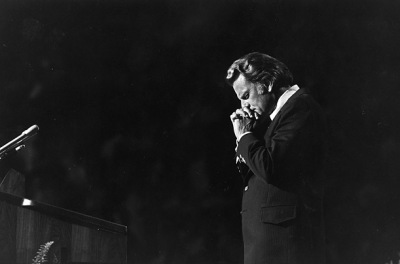New York Times critic sings praises of Billy Graham

NEW YORK (Christian Examiner) – In a critique of a recently released book on the life of Billy Graham, New York Times reviewer Robert P. George offered a thorough assessment of Grant Wacker's America's Pastor with strong approval of this "academic project in the best sense."
"It is not a biography, but rather a disciplined, admirably fair-minded effort to understand and explain how a 20th-century American culture produced a figure like Billy Graham and how Graham in turn helped to shape that same culture," he said.
But George's personal thoughts about Billy Graham revealed as much about the evangelist's impact on America as anything published in Wacker's book.
"I grew up in West Virginia as a Catholic in a Protestant culture, the kind we would today describe as evangelical," the reviewer wrote. "We Catholics had the pope — but he was a distant and, to be blunt, foreign figure.
"Our Protestant neighbors had Billy Graham, the friend of presidents, business magnates and celebrities," he continued, "who through the magic of television was a frequent, familiar guest in the homes of ordinary people; and he was as American as apple pie.
"We didn't admit it in those days, but we Appalachian Catholics — like, I suspect, many of our coreligionists throughout the land — envied those Protestants," George recalled.
"We figured that Billy Graham made being a Protestant in America something like what it was to be a Catholic in Italy," George observed. "And while we weren't quite sure it wasn't a little bit disloyal to watch, listen to and even like and admire a Protestant preacher, watch and listen many of us did — sometimes against the warnings of our parish priests or the nuns who taught us in parochial schools."
According to him, "It was hard not to watch and listen to Graham. He was mesmerizing: movie star looks; a strong, compelling voice; a charmingly soft Southern accent; stage presence.
"His message was as simple as it was powerful: Our lives on earth are short. Soon enough each of us will die. Do you want to go to heaven? Then you must give your life to Christ. You must accept him as your Lord and Savior and enter into a personal relationship with him. He is even now lovingly extending his hand to you. Will you not take it?
"Quoting Scripture, he would say, 'Now is the accepted time; today is the day of salvation. This is the hour of decision,' " George detailed.
He even recalled the impacting influence of "Graham's superb musical team" and the "moving old hymn 'Just as I Am,'" that would accompany Graham's invitation on radio and television to stand up and give your life to Christ.
"Watching from home, even we Catholics felt the impulse to get out of our seats," he said, "though we believed that we already belonged to Christ sacramentally, through baptism."
George cited Graham's appeal in terms of "manifest integrity" and compared the evangelist to Pope John Paul II in terms of world influence in the 20th century, and his reasoning showed someone who was personally touched by Graham's ministry.
"Countless souls of all races in the United States and around the globe came to Christianity as a result of Graham's ministry," he said.
"A John Paul II event, whether in Paris, New York, Los Angeles or Manila, resembled nothing so much as one of Graham's crusades — a vast crowd in an allegedly postreligious age," George assessed, adding "and often in an allegedly post-Christian city, drawn to a larger-than-life figure preaching a demanding message of repentance and reform, but doing it with the accent on God's mercy and the liberating joy of the Christian life."
Reflectively, George spoke about "those Catholics" in the 1960s and '70s who watched and admired Billy Graham as "ahead of their time."
"Perhaps they perceived that doctrinal differences, though important, did not dissolve the bond of Christian brotherhood," George seemed to confess about himself. In the end it was Graham's heart that made him "America's pastor," he wrote.
And, it seems, Graham's heart was part of what touched George, too.
George is the McCormick professor of jurisprudence at Princeton University and authored "Conscience and Its Enemies."